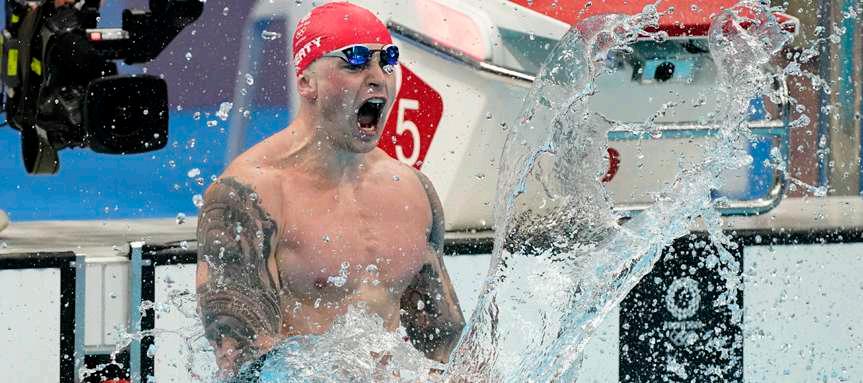
4 minute read
BEST INDIVIDUAL RELAY PERFORMANCE
6-tenths for Apple as he tried to hold off Scott.
Days before Apple faded in the 800 free relay, he had excelled as the anchor swimmer on the U.S. men’s 400 free relay, splitting 46.69 to expand a tiny lead and secure a gold medal. This time, Apple split a phenomenal 46.95 to expand the lead on Scott and win gold. The final time was 3:26.78, smashing the world record set by a U.S. team during the supersuit-era 2009 World Championships.
Advertisement
Once again, the Americans had delivered a signature medley relay performance to close the swimming portion of the Summer Olympics.
“It’s hard to mess that up when you have two world record holders and the fastest American breaststroker ever in front of you. I had an easy job there,” Apple said. “It’s such an honor to represent the USA, especially in relays, and to come home with gold and a world record is the icing on top.” — David Rieder
BEST INDIVIDUAL RELAY PERFORMANCE: ADAM PEATY
(100 BREAST/400 MEDLEY RELAY)
No one can touch him. In an individual race, the competition is battling for the silver medal, such is the chasm created by Great Britain’s Adam Peaty in the 100 meter breaststroke. At the Olympic Games in Tokyo, that domination yielded Peaty a second consecutive gold medal in his showcase event. But his talent also had a significant impact in relay action.
In Peaty, Great Britain’s medley relays—male and mixed— have a game-changing athlete. Sure, many countries can cite someone who gives them an edge in a specific stroke, but Peaty brings an otherworldly advantage. As Great Britain secured a silver medal and set a European record in the 400 meter medley relay (3:27.51), Peaty dropped the fastest breaststroke split in history, a time of 56.53.
The effort is Swimming World’s selection for “Best Individual Relay Performance” of the Games. Although the United States won gold in the event, clocking a world record of 3:26.78, it was Peaty who kept Great Britain in contention. He was 1.58 seconds faster than the 58.11 split of Italy’s Nicolo Martinenghi, who was secondquickest in the field. Over Michael Andrew of the U.S., Peaty held a 1.96-second edge.
Without Peaty, Great Britain would have almost certainly finished off the podium. Having that kind of influence on a relay is rarely seen, and obviously provides the British coaching staff a level of comfort. In the mixed medley relay, which Great Britain won in world-record time, Peaty was timed in 56.78 (second fastest all-time), and again shifted the dynamic of the race.
Through his performances, Peaty has shown his teammates what is achievable, and has sparked British swimming into a new era. Expectations have been elevated, with the focus now shifting to the 2024 Olympic Games in Paris.
“We’ve got champions who believe we can win,” Peaty said. “We have champions who believe we can get world records. If you’ve got more belief, you can build everything around that.”
The runnerup to Peaty for “Individual Relay Performance” of the Games was American Caeleb Dressel and his split of 49.03 on the butterfly leg (also history’s fastest) in the next 100 meters of the same race. Dressel was more than a second faster that the opposition on his leg and answered Peaty’s breaststroke with the dominant contribution the United States needed.
There were several other contenders with exceptionally fast relay splits, including a push from Peaty’s countryman Duncan Scott. As Great Britain just missed the world record in the 800 freestyle relay, but routed the field, Scott anchored the Brits in 1:43.35. The swim was more than a second quicker than anyone else in the field and helped Great Britain to a European record of 6:58.58.
On the women’s side, consideration was given to the performances of Australian Emma McKeon in the 400 freestyle relay and the United States’ Katie Ledecky in the 800 freestyle relay. As Australia stormed to a world record of 3:29.69, McKeon delivered a third-leg split of 51.35, an outing that guaranteed her nation’s victory and enabled Cate Campbell to take a 52.24 coronation lap on the anchor leg. Meanwhile, Ledecky anchored her relay in 1:53.76, a swim that nearly rallied Team USA to the gold medal. Ultimately, it was China registering a world record of 7:40.33, with the U.S. also under the former global standard (Australia’s 7:41.50 in 2019) in 7:40.73. — John Lohn
>> Breaststroker Adamy Peaty gives Great Britain a game-changing, otherworldly advantage in the medley relays. In Tokyo, he recorded history’s fastest breaststroke split (56.53) en route to a silver medal and European record in the 400 medley relay...and the second fastest split (56.78) in the Brits’ world recordsetting mixed medley relay. [ Photo Courtesy: Rob Schumacher / USA Today Sports ]







